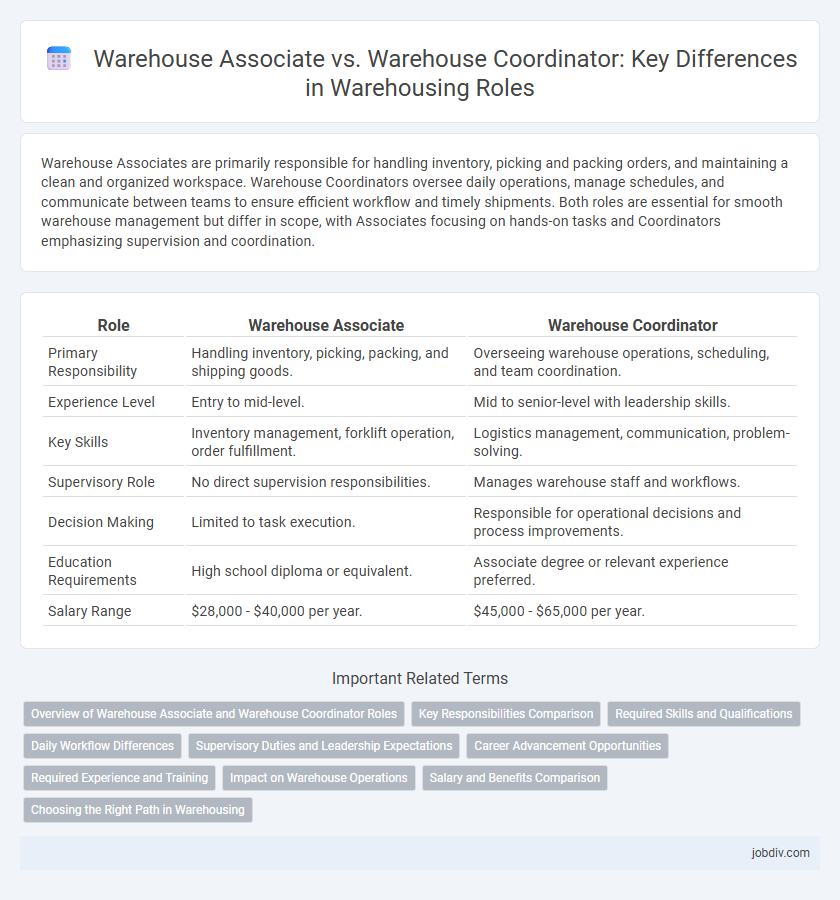Warehouse Associates are primarily responsible for handling inventory, picking and packing orders, and maintaining a clean and organized workspace. Warehouse Coordinators oversee daily operations, manage schedules, and communicate between teams to ensure efficient workflow and timely shipments. Both roles are essential for smooth warehouse management but differ in scope, with Associates focusing on hands-on tasks and Coordinators emphasizing supervision and coordination.
Table of Comparison
| Role | Warehouse Associate | Warehouse Coordinator |
|---|---|---|
| Primary Responsibility | Handling inventory, picking, packing, and shipping goods. | Overseeing warehouse operations, scheduling, and team coordination. |
| Experience Level | Entry to mid-level. | Mid to senior-level with leadership skills. |
| Key Skills | Inventory management, forklift operation, order fulfillment. | Logistics management, communication, problem-solving. |
| Supervisory Role | No direct supervision responsibilities. | Manages warehouse staff and workflows. |
| Decision Making | Limited to task execution. | Responsible for operational decisions and process improvements. |
| Education Requirements | High school diploma or equivalent. | Associate degree or relevant experience preferred. |
| Salary Range | $28,000 - $40,000 per year. | $45,000 - $65,000 per year. |
Overview of Warehouse Associate and Warehouse Coordinator Roles
Warehouse Associates are responsible for hands-on tasks such as receiving, storing, and shipping inventory while maintaining accurate records and ensuring safety protocols. Warehouse Coordinators oversee operational workflows, manage inventory levels, coordinate staff schedules, and serve as a communication link between warehouse teams and management. These roles complement each other by combining tactical execution with strategic planning to optimize warehouse efficiency.
Key Responsibilities Comparison
Warehouse Associates handle hands-on tasks such as receiving, sorting, and storing inventory, as well as order picking and packaging to ensure accurate shipment preparation. Warehouse Coordinators focus on managing workflow coordination, scheduling shipments, and overseeing inventory control processes to optimize warehouse efficiency. The Coordinator role requires stronger communication and organizational skills to liaise between teams, while Associates emphasize operational execution and physical handling of goods.
Required Skills and Qualifications
Warehouse Associates require proficiency in inventory management, basic forklift operation, and strong organizational skills to efficiently handle shipping, receiving, and stock management. Warehouse Coordinators need advanced communication abilities, leadership experience, and expertise in logistics software to oversee daily warehouse operations and coordinate teams. Both roles demand attention to detail, physical stamina, and knowledge of safety protocols to maintain operational efficiency.
Daily Workflow Differences
Warehouse Associates primarily handle hands-on tasks such as receiving, picking, packing, and shipping inventory, ensuring accurate order fulfillment and maintaining stock organization. Warehouse Coordinators focus on overseeing daily operations, managing team schedules, tracking inventory levels, and coordinating communication between departments to optimize workflow efficiency. While Associates execute physical warehousing functions, Coordinators emphasize workflow management and process optimization to support overall operational goals.
Supervisory Duties and Leadership Expectations
Warehouse Associates primarily perform hands-on tasks such as inventory management, order picking, and packing, with limited supervisory responsibilities focused on task execution. Warehouse Coordinators hold leadership roles that include overseeing daily operations, managing staff schedules, ensuring safety compliance, and facilitating communication between teams to optimize workflow efficiency. Effective Warehouse Coordinators demonstrate strong leadership qualities, problem-solving skills, and the ability to motivate and guide associates towards meeting organizational goals.
Career Advancement Opportunities
Warehouse Associates gain foundational skills through hands-on tasks like inventory management and order fulfillment, forming a critical base for career growth. Warehouse Coordinators typically oversee logistics operations and team management, providing leadership experience essential for advancing into supervisory or managerial roles. Progression from Associate to Coordinator unlocks pathways to roles such as Warehouse Supervisor, Logistics Manager, and Supply Chain Analyst, enhancing career prospects in warehousing.
Required Experience and Training
Warehouse Associates typically require basic warehouse safety training and minimal hands-on experience, often gained through on-the-job training for operating forklifts and inventory management systems. Warehouse Coordinators usually need several years of warehouse operations experience, combined with advanced skills in staff supervision, logistics coordination, and proficiency in warehouse management software (WMS). Formal certifications such as OSHA safety standards and supply chain management courses are often preferred for Warehouse Coordinators to optimize operational efficiency.
Impact on Warehouse Operations
Warehouse Associates perform essential hands-on tasks such as inventory management, order picking, and shipment preparation, directly influencing daily operational efficiency. Warehouse Coordinators oversee workflow coordination, resource allocation, and communication between teams, ensuring smooth operational processes and reducing bottlenecks. Both roles contribute critically to warehouse productivity, with Associates focusing on execution and Coordinators on strategic management and process optimization.
Salary and Benefits Comparison
Warehouse Associates typically earn an average hourly wage ranging from $14 to $19, while Warehouse Coordinators receive higher salaries averaging $18 to $25 per hour due to increased responsibilities. Benefits for Coordinators often include enhanced health insurance plans, paid time off, and professional development opportunities, which are more limited for Associates. The salary and benefits gap reflects the coordinator's role in overseeing inventory accuracy, staff scheduling, and logistics management compared to the operational focus of associates.
Choosing the Right Path in Warehousing
Warehouse Associates handle daily tasks like inventory management, order picking, and shipping, requiring strong attention to detail and physical stamina. Warehouse Coordinators oversee operations, coordinate staff schedules, and ensure efficient workflow, demanding leadership skills and experience in logistics. Selecting the right path depends on whether you prioritize hands-on roles or management and coordination within warehousing environments.
Warehouse Associate vs Warehouse Coordinator Infographic

 jobdiv.com
jobdiv.com